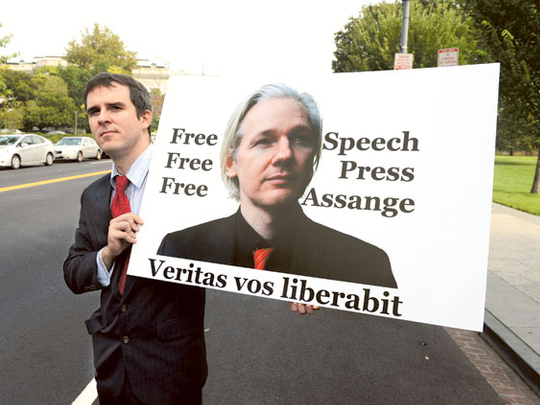
MOSCOW: Julian Assange will resume his broadcasts on Russian television once his legal troubles are over, a Russian television journalist said on Saturday after meeting the WikiLeaks founder in the Ecuadorean embassy in London where he has taken refuge.
“I spent an hour with him and we concluded that when all that is over, and I hope it ends soon, we will certainly resume cooperation with Assange,” the editor in chief of RT [Russia Today], Margarita Simonian, told the daily Moskovskii Komsomolets.
Simonian said she recently visited the Ecuadorean embassy in London to speak with Assange, whom she found “fit and well, jovial, at ease.”
RT, the public television channel broadcast in English, Arabic and Spanish around the world, has already broadcast 12 programmes presented live by Assange who interviewed leading personalities.
The latest programme was broadcast in May, before Britain’s supreme court gave its green light for Assange to be extradited to Sweden where prosecutors want to question him over rape and sexual assault allegations from two women.
The Australian has since taken up refuge in the Ecuadorean embassy.
Quito granted Assange political asylum on August 16, but London has refused to let him leave Britain a free man.
The Organization of American States declared “solidarity and support” Friday for Ecuador in its dispute with Britain over granting asylum to WikiLeaks founder Julian Assange.
The meeting of the Americas bloc was convened at Ecuador’s request to consider a resolution rejecting any attempt to put at risk the “inviolability” of its embassy in London, where Assange is holed up.
In the resolution, foreign ministers and representatives of the 34-member regional body rejected “any attempt that might put at risk the inviolability of the premises of diplomatic missions.”
The text, adopted by consensus after five hours of arduous negotiations in Washington, also expressed “solidarity and support for the government of the Republic of Ecuador.”
It urged Ecuador and Britain to “continue to engage in dialogue in order to settle their current differences in accordance with international law, taking into account the statements made recently by authorities of both governments.”
Reservations about the resolution were expressed in footnotes by the United States and Canada, OAS members who are also firm British allies.
The diplomatic confrontation over Assange, who has been staying at the Ecuadoran mission since June 19, reached a new pitch last week after Quito announced it was granting the 41-year-old Australian activist asylum.
Correa expressed relief at receiving assurances from London on Thursday that ruled out the possibility of British authorities forcibly entering his country’s embassy.
“While it is clear that there was a threat, we understand this message as a retraction of that threat, which we welcome with joy,” Correa said in an address broadcast on national television and radio.
Britain’s permanent observer to the OAS, Philip Barton, echoed London’s statement that it never threatened to enter the Ecuadoran embassy.
“At no time did the UK make any threat against the embassy of Ecuador,” he said, calling for a resumption of dialogue.
“We invite the government of Ecuador to resume as early as possible the constructive discussion we’ve held on this matter to date.”
Speaking to the British newspaper The Guardian, Correa insisted that “the window of dialogue has never been closed.”
“But we are never going to give up our principles, nor the human rights of Mr Assange,” he added.
“As a consequence, we’ll continue to demand what we’ve been demanding from the beginning: if Mr Assange goes to Sweden to face Swedish justice, as is his will and as is our will, he should receive a guarantee that he will not be extradited to a third country.”
Correa repeated his demand that London grant Assange “safe passage” to exit the embassy.
Assange took refuge there to escape extradition to Sweden, where he is sought for questioning about sex assault allegations.
He claims that if extradited to Sweden, he would be handed over to the United States, where he fears prosecution over WikiLeaks’ release of a vast cache of confidential US government files.
Ecuador is demanding a “public apology” from Britain for allegedly threatening to enter the Ecuadoran embassy in London to arrest Assange.
During the OAS debate, Ecuadoran Foreign Minister Ricardo Patino condemned Britain for what he called the “assault on our sovereignty.”
While Britain has said it will not go into the embassy to arrest Assange, it has refused to grant the Australian national safe conduct out of the country.












